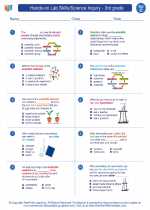Universal Solvent
A universal solvent is a substance that has the ability to dissolve a wide range of different solutes. The most well-known universal solvent is water. Water is often referred to as the "universal solvent" because it has the ability to dissolve a wide variety of substances. This is due to its unique chemical structure and properties.
Properties of Water as a Universal Solvent
- Polarity: Water is a polar molecule, meaning it has a slightly positive charge on one end and a slightly negative charge on the other. This polarity allows water to easily interact with and dissolve other polar or ionic substances.
- Hydrogen Bonding: Water molecules are able to form hydrogen bonds with other molecules, which enhances its ability to dissolve substances.
- Versatility: Water can dissolve a wide range of substances, including salts, sugars, gases, and some types of organic compounds.
Examples of Water as a Universal Solvent
Water's ability to act as a universal solvent is evident in many natural processes and everyday life, such as:
- Dissolving salt in water to create a saline solution
- Breaking down sugar crystals in water to make a sweet solution
- Allowing nutrients to dissolve in water for absorption by plants and animals
- Forming rivers and streams by dissolving and transporting minerals and sediments
Study Guide
When studying the concept of a universal solvent, consider the following key points:
- Define the term "universal solvent" and provide examples of substances with this property.
- Describe the unique properties of water that enable it to act as a universal solvent, including its polarity, hydrogen bonding, and versatility.
- Explain the significance of water as a universal solvent in various natural and industrial processes.
- Explore the role of water as a universal solvent in the environment and its impact on living organisms.
By understanding the concept of a universal solvent and the role of water in this capacity, you can appreciate the importance of water in various chemical, biological, and environmental contexts.
.◂Science Worksheets and Study Guides Third Grade. Hands-on Lab Skills/Science Inquiry - 3rd grade
Study Guide Hands-on Lab Skills/Science Inquiry - 3rd grade
Hands-on Lab Skills/Science Inquiry - 3rd grade  Worksheet/Answer key
Worksheet/Answer key Hands-on Lab Skills/Science Inquiry - 3rd grade
Hands-on Lab Skills/Science Inquiry - 3rd grade  Worksheet/Answer key
Worksheet/Answer key Hands-on Lab Skills/Science Inquiry - 3rd grade
Hands-on Lab Skills/Science Inquiry - 3rd grade  Worksheet/Answer key
Worksheet/Answer key Hands-on Lab Skills/Science Inquiry - 3rd grade
Hands-on Lab Skills/Science Inquiry - 3rd grade  Worksheet/Answer key
Worksheet/Answer key O-W-L
O-W-L  Vocabulary/Answer key
Vocabulary/Answer key Hands-on Lab Skills/Science Inquiry - 3rd grade
Hands-on Lab Skills/Science Inquiry - 3rd grade  Vocabulary/Answer key
Vocabulary/Answer key Hands-on Lab Skills/Science Inquiry - 3rd grade
Hands-on Lab Skills/Science Inquiry - 3rd grade 

 Worksheet/Answer key
Worksheet/Answer key
 Worksheet/Answer key
Worksheet/Answer key
 Worksheet/Answer key
Worksheet/Answer key
 Worksheet/Answer key
Worksheet/Answer key
 Vocabulary/Answer key
Vocabulary/Answer key
 Vocabulary/Answer key
Vocabulary/Answer key

The resources above cover the following skills:
Science as Inquiry and Process: A student should understand and be able to apply the processes and applications of scientific inquiry. A student who meets the content standard should:
Develop an understanding of the processes of science used to investigate problems, design and conduct repeatable scientific investigations, and defend scientific arguments.